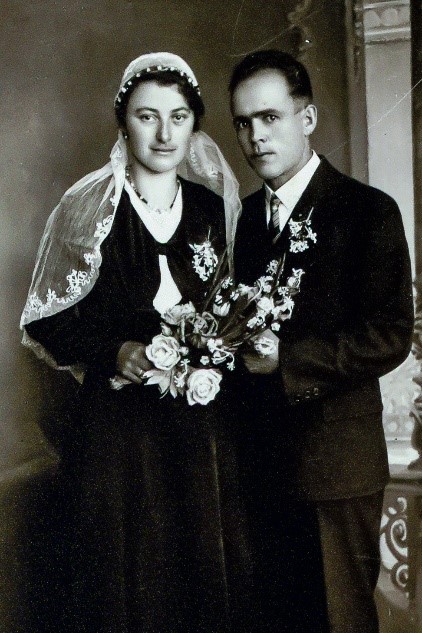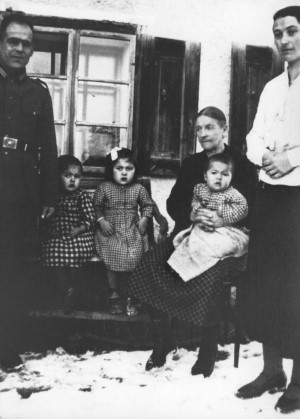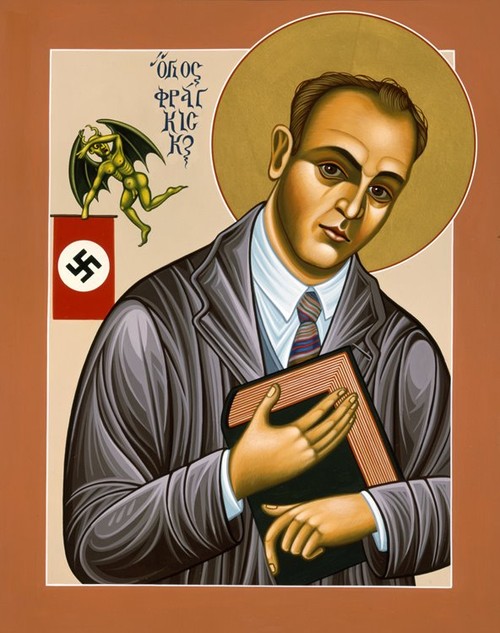October 30, 2020
My dearest family,
It is Halloween, so let me tell you the story of a Hallowed one. It is the story of Blessed Franz Jäggerstätter was faced with a choice with dire consequences: take the oath of loyalty to Adolph Hitler or refuse to collaborate and face probable execution

Franz was not particularly ‘remarkable’ – he was an Austrian Bauer from the countryside. His was a wild youth, he fathered a daughter out of wed-lock, inherited his step-father’s farm (his own father was killed in the First World War) and – perhaps most crucially – fell wildly in love and married a remarkable woman of deep faith in 1936, Franzciska Schwaninger. Together they had three daughters of their own and lived a simple Catholic life in Sankt Radegund widely thought of as the happiest couple in town.
Theirs were troubled times. The Nazi Anschluss of 1938 saw Austria become part of the Reich – everyone in Sankt Radegund voted in favour of this …except for Franz. With war came conscription and Franz went through military training – but he refused the Hitler-Oath. There was an ‘out’ for the moment: Franz was a farmer and so was released to work in this crucial part of the war effort. But the Nazis had their eyes on him, his wife and Pastor were worried about him, and his community was angry with him. The war chewed up the young men in the army and Franz again was conscripted. This time there was no avoiding the Hitler-Oath. Austria was part of the Reich, enlistment in the army was a national duty, and Franz was jailed as a traitor for refusing the Oath.

A priest from home came and encouraged him to sign and serve: he had three children at home – the eldest only six years old. And his wife? He was wildly in love with his wife and she with him. She said, “In the beginning, I really begged him not to put his life at stake, but then, when everyone was quarreling with him and scolding him, I didn’t do it anymore… If I had not stood by him, he would have had no one.”
He had formed his conscience, however, having spent the time since his first conscription examining what was happening around him. He visited his Bishop in Linz had left him troubled that the euthanasia program and the persecution of the Church was not being confronted by the hierarchy intent on ‘weathering the storm’. He was convinced that this was an immoral regime and an immoral war. The witness of the execution of the young Schoenstatt priest, Father Franz Reinisch, who had been executed for refusing the Hitler-Oath, steeled his purpose. Every time the oath was put before him, he would not sign.
There is nothing harsher than a regime built on pure power confronting an irritating “nobody” who resists. The Nazis were swift: he was sent away to Brandenburg and on August 9, 1943 he was marched to the guillotine. But regimes built on pure power do not like martyrs. At the foot of the scaffold he was again given the chance to take the Hitler-Oath. The night before he had written these last words, “”I am completely bound in inner union with the Lord“. So, he said “yes” to the Eternal Jesus and and said “no” to the Prince of this World.
Fani and the girls were sent a small package of his letters and belongings.
Blessed Franz wrote these reflections in 1942,
“‘I perceive that many words will not accomplish much today. Words teach, but personal example shows their meaning. People want to observe Christians who have taken a stand in the contemporary world, Christians who live amid all of the darkness with clarity, insight, and conviction, Christians who live with the purest peace of mind, courage and dedication amid the absence of peace and joy, amid the self-seeking and hatred. People are looking for Christians who are not like a wavering reed that is pushed back and forth by every light breeze, for Christians who do not watch to see how their associates will respond to this or that point. If signposts are set in the ground so loosely that they can be turned by every wind and, as a result, point in this direction and then in that direction, is someone for whom the way is unfamiliar able to find the right path?’”
(Franz Jäggerstätter: Letters and Writings from Prison)
What happened after the war? Franziska never remarried, she ran the farm, raised the girls, cared for Franz’s mother, and was rejected by the people of Sankt Radegund. Franz had been in the army when executed – but she received no widow’s pension and his name was not put on the town war memorial. The returning soldiers were treated as heroes – Franz was reviled as a coward. The Austrian people rushed to move on with their lives pleading ignorance of the evils of the Reich – Franz, Fr. Reinisch, and other ‘objectors’ put the lie to this and so their memory ignored. Thus, Fani and the girls continued in this way to share in the martyrdom of their beloved Franz.
Thirteen years ago this month, October 26, 2007, the Bishop of Linz welcomed Frau Jäggerstätter, her three daughters, Maria, Aloisia, and Rosalia, and Franz’s other daughter Hildegard to his Cathedral for the Beatification of Franz. Five thousand people rose to their feet with applause as the 94-year-old Fani and her family entered. She brought up an urn containing a bone of her husband, kissed it, and handed it over to be venerated by others just as she had handed her beloved over sixty-four year before. She died at the grand age of one hundred years in 2013.
Franz wrote to Fani before his execution, “Dearest wife and mother. It was not possible for me to spare you the pain that you must now suffer on my account. How hard it must have been for our dear Savior when, through his sufferings and death, he had to prepare such a great sorrow for his mother—and they bore all this out of love for us sinners. I thank our dear Jesus, too, that I am privileged to suffer and even die for him … May God accept my life in atonement not only for my sins but for the sins of others as well.”
One thing everyone who met Franz and Fani remarked on was their joy.
Joy in suffering. I have been transfixed for weeks by these words of St. James, “My brothers and sisters, whenever you face trials of any kind, consider it nothing but joy, because you know that the testing of your faith produces endurance; and let endurance have its full effect, so that you may be mature and complete, lacking in nothing.” (James 1:2-4)
The mark of a Christian martyr is joy – that is the infallible sign of God’s Will being done.
Taking the Hitler-Oath and taking the current set of vaccines do not appear to me to be objectively the same thing.
There is one thing that is the same. As the German bishops wrote on June 26, 1941, “There exists the sacred duties of conscience from which no human being can free us, and which we must fulfill even if it costs life itself.”
Pope Francis has called taking the vaccine “an act of love”. As Bishop Mark has stated along with the Congregation for the Doctrine of the Faith, that in good conscience, many Catholics have taken this “morally acceptable” vaccine – often simply with regard to the “common good”.
Not a few of our brothers and sisters in the faith, however, have judged that these vaccines are not “effective and safe from a medical point of view, as well as ethically acceptable” (CDF, 2020). I accept that most do this with regard to the “common good” as well.
That either group should suffer scorn and excommunication because of following their “sacred duties of conscience” in this matter cannot happen in any community of the Lord. It is deeply scandalous to me that this society of such medical and social resources should fall back on the punitive exercise of power and set aside respect for the “sacred duties of conscience”.
Raw evaluation of “usefulness” is the ever-present threat of modern technology.
The Reign of God which is, “righteousness and peace and joy in the Holy Spirit” (Rom. 14:17) is the ever-present promise of Jesus Christ.
Blessed Franz shows us where to look to see if we are of the Lord, “personal example shows their meaning …Christians who live with the purest peace of mind, courage and dedication amid the absence of peace and joy, amid the self-seeking and hatred”.
Whatever we do is an “act of love” if it is filled with joy that comes from the Holy Spirit.

With joy I will lead this community to stand with those who are alone, sick, and afraid that this virus will take their lives.
With joy I will lead this community to stand with those who are facing the prospect of losing their livelihoods.
I can only learn from Fani Jäggerstätter who said,
“If I had not stood by him, he would have had no one.”
My dear family, let us stand with one another.
Blessed Franz Jäggerstätter, pray for us.
Beautiful Franziska Jäggerstätter, rest in peace.
Fr Stefano Penna
The Eve of All Saints’ Day, 2021
